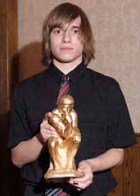The Online Magazine of the Academic Games Leagues of America
| AGLOA News | Outstanding Seniors | Down Memory Lane | Past AGazines |
|
News and Notes The posting of the 2012-13 Tournament Rules for all games along with any changed documents (such as variation sheets) is nearly complete. The most recent postings are these:
|
|
The AGLOA Board has made the following appointments. Tournament Council
Alumni Council
Finance Council
|
|
Other Items
|
|
2012 Outstanding Seniors: Ridwan Syed and Dustin Wright This is a case of “you can’t include one without the other.” Ridwan Syed and Dustin Wright have been Academic Games teammates for eight years at Haynes Academy for Advanced Studies in Jefferson Parish LA. They have excelled at LinguiSHTIK, Equations, On-Sets, Propaganda, and Presidents throughout that time, winning numerous individual titles and leading their teams to numerous local and national championships. The Outstanding Senior Nomination Form for each lists “too many to count” on the line for “Which National Championships has the nominee won?” At the risk of omitting an award, here’s at least a partial list of their titles from the last four years, which is impressive enough.
Their lasting contribution to Academic Games, however, will be the “Thinking Kids Project.” After winning sweepstakes their sophomore year, they wanted to share the great feeling that had. So they volunteered to coach at various schools in the New Orleans area. Another aspect of the project was developing a collective resource library to make the games more accessible to a larger audience. Emulating another Jefferson Parish AG player, Salman Kahn, founder of the incredibly successful Khan Academy website, Ridwan created videos to teach the games such as one on On-Sets. Both students became certified judges so that they could officiate in their own parish and at NOAGL tournaments. Ellie Gamble, their coach, relates an incident that illustrates Ridwan’s effectiveness as a coach.
Ellie also recalled her first meeting with Dustin.
|
|
Down Memory Lane Once upon a time, Equations players in Middle, Junior, and Senior Divisions could pick two or even three multiples of k for the same shake. After one player picked k, another could also pick k with a different value. For example, if one player chose k = 7 and another k = 11, then the Solution had to differ from the Goal by a multiple of 77. If the two values of k were 6 and 10, the Solution had to differ by a multiple of 30, the LCM of 6 and 10. The rules were amended for 1986-7 to prohibit calling k a second time in a shake. The rationale for the change was to “cut down on the additional teaching that must be done to cover those rare instances when two k‘s are selected and allow more time to concentrate on all the mathematics involved with one value of k.” |



